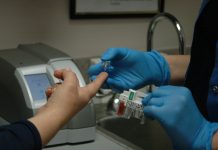
No, and it would not be wise. Your pancreas produces insulin to move glucose into cells where it is metabolized into energy which fuels the body. When your blood glucose returns to a normal range 70 – 105 milligrams per deciliter, your pancreas produces a hormone called glucagon that stimulates the release of glycogen (stored glucose) from liver and from muscles if you are exercising. Glycogen is broken down and replenishes the glucose in your blood. This keeps your blood glucose within normal ranges between meals while you go about your activities and exercise.
People with diabetes who do not take insulin have higher than normal levels of insulin in their blood. Their insulin receptor sites on cells seem to be less responsive to insulin and higher levels of insulin are needed to move glucose into a cell. Also, because the body cannot turn off the injected insulin, it continues to be available to move glucose into cells. Once glucose is inside cells, the energy is released for use by the body or converted into fat for storage.



